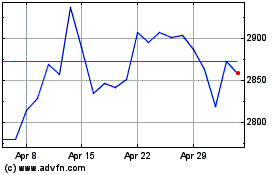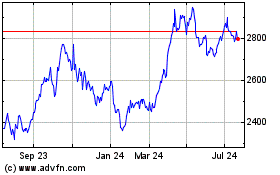Shell Weighs More Divestments as Its Profit Falls Sharply -- WSJ
January 31 2020 - 3:02AM
Dow Jones News
By Sarah McFarlane
This article is being republished as part of our daily
reproduction of WSJ.com articles that also appeared in the U.S.
print edition of The Wall Street Journal (January 31, 2020).
LONDON -- Royal Dutch Shell PLC said it could ratchet up
divestments as it reported a sharp drop in profit for 2019.
The company slowed the pace of spending on share buybacks,
fueling doubts that it would meet its goal of completing the $25
billion program this year, and cut the value of its U.S. Appalachia
assets amid low natural gas prices.
"All macroeconomic indicators are working against us," said
Shell's Chief Executive Ben van Beurden on Thursday.
Shell and many of its energy-sector peers have suffered from
lower commodity prices and weaker refining and chemical margins in
the past year, with weaker results making it more difficult for
some companies to keep up their returns to shareholders.
U.S. energy giants Exxon Mobil Corp. and Chevron Corp. are set
to report results on Friday.
The difficult market conditions are challenging Shell's plans to
transform itself into a lower-carbon business as governments focus
on tackling climate change by supporting new technologies such as
electric vehicles and renewable energy.
Shell said its investments in 2020 would be at the low end of
the range it had targeted of $24 billion to $29 billion. The
company confirmed that this would mean spending on energy projects
such as wind and solar power would also be at the low end of the
previous guidance of between $1 billion and $2 billion.
The company has spent $2.3 billion on so-called new energies
since 2017 and at its management day in June last year set out
ambitions to incrementally increase its spending in this area.
"The weak macro backdrop is not conducive to Shell being able to
decarbonize unless they can reduce their debt," said Christyan
Malek, head of oil-and-gas research for Europe, the Middle East and
Africa at JPMorgan. "This places a strong emphasis on their oil and
gas business which is critical to funding its transformation."
Shell plans to divest $10 billion in assets in the 2019 to 2020
period and has already achieved around half of that, but Mr. Van
Beurden said the company was working on deals that could amount to
about $13 billion for the period.
"How that pans out depends a little bit on the pace at which we
can close deals, and we will be driven by an economic rationale,
rather than a desire to have early cash," he said.
Shell divested around $30 billion of assets in the 2016 to 2018
period, after its $50 billion acquisition of BG Group.
That deal also saw Shell commit to a $25 billion share buyback
program that started in July 2018 and has reached $15 billion so
far. The company plans to cut spending on the program to $1 billion
in the period to April 27 from $2.75 billion for the three months
ended Jan. 27.
Biraj Borkhataria, co-head of European energy research at RBC
Capital Markets, said Shell was unlikely to reach the $25 billion
target by the end of 2020, and mid-2021 was a more realistic time
frame.
The company's shares were down 3.7% in European trading on
Thursday.
The decision to slow the pace of spending on buying back shares
came after Shell's gearing level -- its net debt as a percentage of
total capital -- rose to 29% in the fourth quarter, above the
company's target of 25% and the 28% level reported for the third
quarter. Gearing levels are one of the measures used by credit
credit-rating firms to assess the risk a company faces. Lenders and
investors tend to perceive a gearing level below 25% as low
risk.
Ratings agency Moody's lead analyst for Shell, Sven Reinke, said
that even with Shell's weak fourth-quarter results the company
"remains solidly positioned with no immediate negative rating
pressure."
Shell confirmed a $2.24 billion impairment charge, mainly
because a global oversupply of natural gas has weighed on U.S.
prices. This follows billions of dollars of cuts to asset values
since October by companies including Chevron, Spain's Repsol SA,
the U.K.'s BP PLC, and Norway's Equinor ASA.
--Adriano Marchese in Barcelona contributed to this article.
Write to Sarah McFarlane at sarah.mcfarlane@wsj.com
(END) Dow Jones Newswires
January 31, 2020 02:47 ET (07:47 GMT)
Copyright (c) 2020 Dow Jones & Company, Inc.
Shell (LSE:SHEL)
Historical Stock Chart
From Mar 2024 to Apr 2024

Shell (LSE:SHEL)
Historical Stock Chart
From Apr 2023 to Apr 2024
